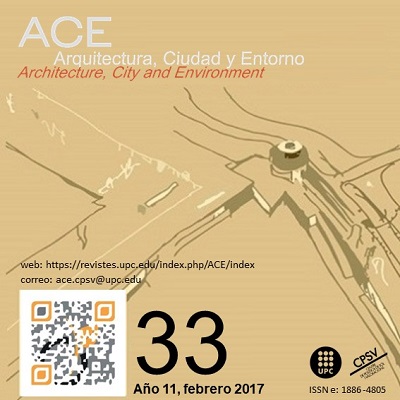Obtaining optimal routes from point cloud surveys
DOI:
https://doi.org/10.5821/ace.11.33.5154Keywords:
Accessibility, multi-criteria analysis, Terrestrial Laser Scanner, heritageAbstract
Within the “City without barriers, Tool for evaluation and visualization of accessibility to public space, based on TLS, GIS and GPS Technologies” project, headed by Professor Josep Roca Caldera, funded in the framework of the RecerCaixa 2013 Call, in the theme The house and the city adapted to the disabled people, there is a need to develop methodologies to study accessibility in urban settings.
Given the complexity of the urban environments and the variants that can be considered from the accessibility (Del Moral, 2010), it is proposed a methodology to carry out systematic analyzes to evaluate the accessibility of urban environments and generate analysis of specific routes, starting from a massive documentation, based on architectural surveys with Terrestrial Laser Scanner Technology TLS.
These TLS surveys of unorganized point clouds are classified and structured, using the methodology proposed in this publication, in relation to the information needed for an accessibility analysis. In this process different types of analysis are used such as the RANSAC algorithm (Schnabel et al., 2007) among others.
Based on this structured information, ráster layers are generated, with accessibility criteria, allowing the analysis of multi-criteria routes, which are applied to two specific urban case studies, with differentiated characteristics.
As a conclusion of these case studies, a clear methodology is proposed, that starts from the classification of points cloud, the generation of specific ráster layers, with specific parameters, to obtain the analysis of accessible routes, depending on the characteristics of accessibility.
Downloads
Published
Issue
Section
License
| INTELECTUAL PROTECTION CRITERIA |
At this moment, it is count with the "Oficina Española de Patentes y Marcas", while global protection it is being processed by the World Intelectual Property Organization (OMPI/WIPO). Nevertheless the International Standard Serial Number Office (ISSN) has given the following numbers ISSN: 1886-4805 (electronic version) and 1887-7052 (paper version). All articles will be peer reviewed, using double blind reviewing. |
| COPYRIGHT |
The article contents and their comments are authors exclusive liability, and do not reflect necessarily the journal editor commitee's opinion. All ACE published works are subject to the following licence CC BY-NC-ND 3.0 ES http://creativecommons.org/licenses/by-nc-nd/3.0/es/ It implies that authors do not hold nor retain the copyright without restrictions but only those included in the licence. |





































